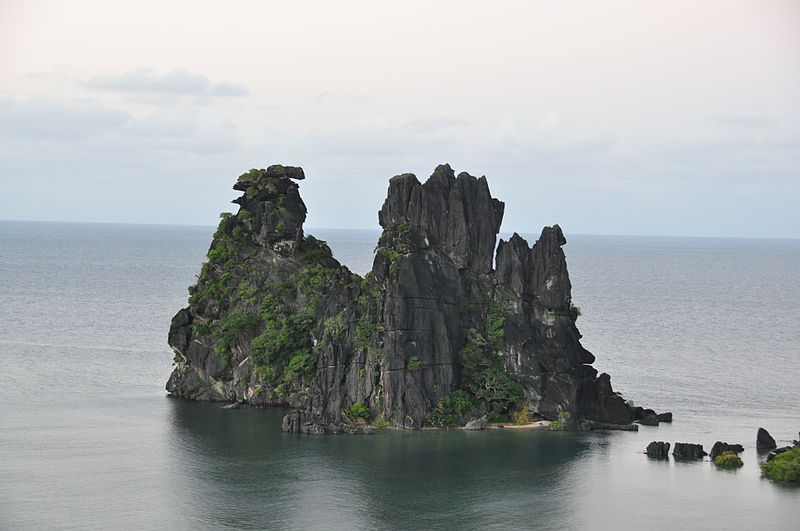New Caledonia prepares for crucial independence vote
Posted By Denise Fisher on November 2, 2018 @ 06:00

With New Caledonia’s independence referendum set for Sunday 4 November, the campaign is in full swing as those for and against independence from France make their cases. The vote raises crucial questions about New Caledonia’s future, and the region’s.
For 30 years, Australia and the region haven’t had to focus much on this French archipelago off the Queensland coast. Since the bitter civil war in the 1980s, New Caledonia, unlike other troubled Melanesian neighbours, hasn’t demanded our attention.
Rather, our French neighbour has been getting on with its inclusive government [1] of conciliation, taking on new institutions and new powers from France under the 1988 Matignon Accord and then the 1998 Noumea Accord, on a promise of this 2018 vote on its future status.
With the main political dynamic still the ‘for’ and ‘against’ divide, the upcoming vote begins the final, potentially four-year, stage of the Noumea Accord, bringing to an end (or at least into question) the predictability, stability and economic growth of the last three decades.
For that reason alone, the referendum process is of interest to the region, which is adjusting to uncertainties of its own [2]—including geostrategic shifts and changes in regional cooperation patterns. New Caledonia’s process coincides with a similar planned referendum in Bougainville, the withdrawal of the regional support mission from Solomon Islands, and ongoing instability in Fiji and Vanuatu.
New Caledonia’s referendum, along with a move by France to adopt a more constructive regional role [3] from the end of the 1990s, represent a consummate diplomatic success by island countries, which formed the South Pacific Forum in 1971 (now the Pacific Islands Forum) in reaction to France’s decolonisation and nuclear-testing policies. The vote begins the final stage in decolonisation, which the forum and the Melanesian Spearhead Group [4] sought for New Caledonia from 1986 when they secured unanimous support for its status as a UN non-self-governing territory.
In the early 2000s, after it made a commitment to the independence parties, France finally agreed to cooperate with the UN Decolonisation Committee, and has invited the UN to observe the vote. Both the Pacific Islands Forum and the Melanesian Spearhead Group are watching the referendum process closely [5].
Sunday’s vote is the first of a possible three between now and 2022 if the result remains ‘no’ to independence. If all three rounds take place, France must conduct discussions on the future. But France has been proactive; last November it established a Dialogue on the Future Committee to convene while the referendum process rolls out. It did so because, regardless of the outcome, differences remain profound between New Caledonia’s indigenous and non-indigenous peoples.
More than 40% of the population are Kanak, whose unique indigenous identity has been acknowledged in the Noumea Accord. French prime minister Edouard Philippe is scheduled to arrive in Noumea on 5 November to continue this dialogue. As one founding accord negotiator said recently [6], there can be no viable long-term solution without involving the Kanaks.
Most polls suggest a ‘no’ vote, this first time, of at least 60%—although the polling has involved small samples and large margins of error. But some independence supporters, the majority of whom are Kanaks, believe they have a chance of success at least by a third vote in 2022, given demographic growth, and if they can get as many supporters to vote as possible. And already, just days before the vote, some pro-France groups [7] are seeking to obstruct the possible second and third votes, disregarding the provisions of the Noumea Accord.
The issues being canvassed in the referendum campaign—key remaining sovereign powers such as defence and foreign affairs, but also control of immigration and of the revenue from the archipelago’s precious nickel deposits—are difficult and highly sensitive, risking a return to violence.
Old tensions have been revived with the emergence in recent years of an extremist independence party and, just a year ago, an extreme loyalist party. The timing of the next local elections, in May 2019, has sharpened the referendum campaign, as these parties position themselves to win support from the moderates.
In the lead-up to Sunday, speakers from most parties have been moving around the three provinces, addressing groups and urging all to vote. The most extreme independence party, whose base is a major union, has called for a boycott [8] of the referendum by its supporters. A pattern of ongoing low-level violence [9] by young Kanaks continues against middle-class Europeans, including stonings of cars, burglaries and personal attacks, albeit without a noticeable increase during the campaign. A week before referendum day, one colonial nickel company mine, which had been blockaded since August by a group of young Kanaks, resolved the dispute by acceding to their demands [10] to stop new projects there.
For Australia and the region, the best outcome will be a peaceful voting process followed by due attention to dialogue to implement the result. But whichever way the vote goes, it’s likely to define a different New Caledonia.
Article printed from The Strategist: https://www.aspistrategist.org.au
URL to article: https://www.aspistrategist.org.au/new-caledonia-prepares-for-crucial-independence-vote/
URLs in this post:
[1] getting on with its inclusive government: http://politicsir.cass.anu.edu.au/sites/default/files/docs/2012-4_Fisher-Noumea-Accord.pdf
[2] which is adjusting to uncertainties of its own: http://www.sciencespo.fr/ceri/en/content/one-among-many-changing-geostrategic-interests-and-challenges-france-south-pacific
[3] more constructive regional role: https://www.policyforum.net/france-australia-new-strategic-partnership-asia-pacific/
[4] Melanesian Spearhead Group: https://www.lowyinstitute.org/the-interpreter/melanesian-spearhead-group-what-it-and-what-does-it-do
[5] watching the referendum process closely: https://foreignminister.gov.au/releases/Pages/2018/mp_mr_180906a.aspx?w=E6pq%2FUhzOs%2BE7V9FFYi1xQ%3D%3D
[6] founding accord negotiator said recently: https://www.lnc.nc/article/nouvelle-caledonie/referendum-2018/politique/l-annee-2019-va-etre-plus-decisive-que-le-referendum
[7] some pro-France groups: https://www.lnc.nc/article/nouvelle-caledonie/referendum-2018/politique/nous-devrons-veiller-a-ne-pas-nous-faire-voler-le-resultat
[8] called for a boycott: https://www.lnc.nc/article/nouvelle-caledonie/referendum/politique/l-union-caledonienne-veut-mobiliser-pour-le-4-novembre
[9] ongoing low-level violence: https://www.lowyinstitute.org/the-interpreter/sensitivities-flare-new-caledonia
[10] resolved the dispute by acceding to their demands: https://www.lnc.nc/article/nouvelle-caledonie/mines/le-blocage-a-kouaoua-leve-mais-pas-toutes-les-craintes
Click here to print.